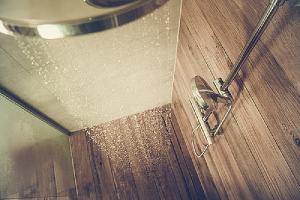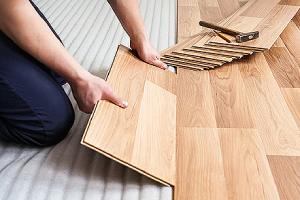 When remodeling your home, appearance is often the main consideration when it comes to flooring. However, when the room in question is a bathroom, performance and usability also deserve equal weight.
When remodeling your home, appearance is often the main consideration when it comes to flooring. However, when the room in question is a bathroom, performance and usability also deserve equal weight.
Bathrooms are constantly exposed to water and moisture. After a warm shower, the entire room may be covered with moisture, and this can ruin flooring that is not up to the task. In addition, safety is a concern in bathrooms as slick flooring can be hazardous, particularly if the bathroom will be used by children or the elderly.
However, there are some flooring choices that look great while also being able to stand up to the unique conditions faced in bathrooms. Outlined below are some attractive flooring options that are suitable for bathrooms.
Best Wood Flooring For Bathrooms
Wood flooring is a popular choice for bathrooms these days thanks to a range of modern options that address some of the problems traditional hardwood encounters in rooms with high moisture.
Vinyl Wood
Waterproof vinyl floors in wood plastic composite are made using a mixture of wood flour and plastic and are completely waterproof. This flooring comes in long planks that look like traditional wood floors. It can be easily cleaned with a mop, and installation is relatively straightforward.
This flooring features four layers for the ultimate protection. The top layer, or wear layer, is thick for maximum durability and protects against scratches, stains and scuffs. The printed vinyl layer can realistically mimic a variety of woods. Beneath this is a waterproof core that resists liquid absorption to avoid swelling, warping and mildew. The buckling layer, which goes against the subfloor, smooths out surface imperfections and gives the floor some spring while muffling any of the hollow sounds that natural hardwood would make.
Engineered Wood
Engineered wood can be used in bathrooms because its plywood base holds up fairly well in the presence of moisture, and its hardwood veneer top layer makes it look very similar to natural wood. Engineered wood flooring is dimensionally stable and has a beautiful appearance, although it can be more expensive than other options.
Laminate Wood
 Laminate flooring is a type of resin-impregnated paper that sits on top of a wood chip base. Its surface is essentially a photo of wood like cherry or oak, with a clear coating on top known as a wear layer that gives it a long life. It can be used in bathrooms as long as the wood base is protected from moisture as water-damaged laminate floors cannot be repaired.
Laminate flooring is a type of resin-impregnated paper that sits on top of a wood chip base. Its surface is essentially a photo of wood like cherry or oak, with a clear coating on top known as a wear layer that gives it a long life. It can be used in bathrooms as long as the wood base is protected from moisture as water-damaged laminate floors cannot be repaired.
Ensure the flooring you choose is truly water-resistant as not all options are suitable for bathrooms. A vapor barrier or underlayment should be used beneath this type of flooring to protect against subfloor moisture.
Best Tile Flooring For Bathrooms
Tile can be a great choice for bathrooms because there are many inexpensive bathroom tile options to choose from that can suit a broad range of styles. It is a highly customizable material with various sizes, shapes and colors available, while the grout offers additional customization options. Tile is easy to clean and highly water-resistant. Although it can be cold, radiant heating can be used to make it feel warm underfoot.
There may be some safety concerns with tile because it is very slippery when wet, but texturing can help reduce the possibility of accidents. Moreover, smaller tiles can be chosen as the greater ratio of grout serves as a non-skid surface.
Ceramic Tile
Ceramic tiles are a great choice on account of their durability. They resist wear and scuffing and are easy to clean with a broom and mop. When used in bathrooms, they must be glazed because of the presence of water.
Larger ceramic tiles are a good choice for smaller bathrooms as they can make the room feel more spacious. However, ceramic tile can be a bit hard underfoot, which may make it uncomfortable to stand on for a long period of time. A small rug or bath mat can be used to alleviate this problem.
Porcelain Tile
Porcelain tile is a popular choice for bathrooms because it is attractive, affordable, and most importantly, waterproof. One factor that makes porcelain tile a standout in the ceramic tile family is its water absorption rate; the Porcelain Tile Certification Agency certifies tile as being “porcelain” when its water absorption rate is 0.5 percent or lower. While this is less of a concern in a powder room or half bathroom due to the lack of bathing facilities, it is an important asset in a full bathroom.
Marble Tile
Marble tile has a luxurious finish that instantly makes a room appear more elegant, but that beauty comes at a price. Not only is it one of the more expensive flooring options, it also requires more maintenance and is more susceptible to damage such as scratching and chipping than other flooring varieties.
Because it is fairly porous, water should not be allowed to stand or puddle on the surface as it can penetrate and discolor the stone. It can also be discolored by acidic substances if not properly and regularly sealed. However, when cared for correctly, there is no other flooring that can imitate its upscale appearance.
Stone Tile
 Although stone is hard and durable, some types of natural stone are not a good choice for bathrooms. Granite, marble and limestone are considered good stone bathroom flooring options. Although they can be expensive, they will provide excellent resale value.
Although stone is hard and durable, some types of natural stone are not a good choice for bathrooms. Granite, marble and limestone are considered good stone bathroom flooring options. Although they can be expensive, they will provide excellent resale value.
Stone can be textured using sandblasting, or naturally textured stone options like slate can be used if slipping is a concern.
Which Flooring Is Best For My Bathroom?
The best type of flooring for your bathroom depends on your budget, safety concerns and the style of the bathroom. It is hard to go wrong with bathroom-friendly waterproof laminate wood or ceramic or porcelain tile, and bathroom remodelers can advise on what will work best in a particular room. For smaller half bathrooms or powder rooms, more expensive varieties may be an option thanks to the low square footage.
However, there are a few types of flooring that should be avoided in bathrooms. Solid hardwood has little protection against moisture and will rot quickly. Although it may still be used if installed with extreme care by professional installers and finished on-site to ensure the seams are coated to stop moisture from getting through, it is not recommended. Wall-to-wall carpeting is also not advisable because it retains moisture and dries out slowly.
Speak With A Northern VA Bathroom Remodeling Contractor
If you are embarking on a bathroom remodeling project, speak with the Northern Virginia bathroom remodeling contractors at Dirt Connections. Their friendly and experienced team can advise on all aspects of the project, from tearing down the existing bathroom to installing flooring and perfecting the finishing touches in your new bathroom.
Summary

Dirt Connections was started with one goal in mind: providing quality residential and commercial construction services to clients on time and on budget. Reach out for more information on how we can support your next project.
For your convenience our estimates are free and by appointment. Call 703-940-9949 for a free estimate today!









































